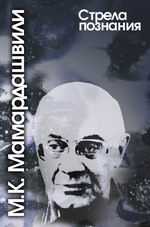Merab Mamardashvili

Merab Mamardashvili (Georgian: მერაბ მამარდაშვილი, Russian: Мера́б Константи́нович Мамардашви́ли; September 15, 1930 – November 25, 1990) was a Georgian philosopher, Doctor of Sciences (1968), Professor (1972). He was born in Gori (Eastern Georgia). In 1955 he graduated from the Faculty of Philosophy of the Moscow State University. From 1968 to 1987 he was a Deputy Editor of the scientific journal "Voprosi Filosofii" ("Questions of Philosophy"). He became a Professor of the Moscow State University and a Senior Research Fellow of the Moscow Institute of Philosophy of the Russian Academy of Science. From 1987-1990 Mamardashvili was head of the Department of the Tsereteli Institute of Philosophy of the Georgian Academy of Sciences and Professor of the Tbilisi State University.
In his life only a few books were published, his lectures (for his style of lecturing he and others called them "conversations" or "dialogues" and he was called "russian (or georgian) Socrates") were taped and published after his death by his disciple Yuri Senokosov. Lecturing abroad, Mamardashvili gave talks in Germany, France, and other countries. He died from a heart attack at a Moscow Airport on November 25, 1990.
Influenced by René Descartes and classical German philosophy (especially Immanuel Kant), Mamardashvili contributed to rationalist theory of perception. His main research fields were: general gnoseological notion of processes of analysis and synthesis, the methodology of science and of the historic-philosophical studies, the role of consciousness in social being, the relationship between consciousness and the aesthetics, the overall meta-theory of language and consciousness. He considered the consciousness the ultimate subject of philosophy. Some of the most famous phrases, coined by Mamardashvili are: "consciousness is paradoxicalness impossible to get used to" (same-titled article can be found here: http://philosophy.ru/library/mmk/paradox.html ), "consciousness is an experience of inexperiencable experiences", "phenomenology is the accompanying feature of all the philosophy", "loneliness is my profession" and so on.
In the preview to the edition of the major compilation of his works by St.-Petersburg publishing house "Azbooka-classica" in 2002 he has been introduced "one of the most interesting contemporary philosophers, the man of impeccable style, magical fascination and rare kindness". There also was noted there, that all of his interests have been concentrated on the human personality, its freedom and responsibility, on the role of philosophy in life and its place in the culture.
In May 2001 a monument to him was unveiled in Tbilisi.
Bibliography
- The process of analysis and synthesis (1958)("Процессы анализа и синтеза")
- Forms and Contents of Thinking (1968) (Формы и содержание мышления)
- Converted form [1970] ( "Форма превращенная" - article for the Encyclopedia of Philosophy)
- Symbol and Consciousness (Символ и сознание), (1974), together with A.Piatigorsky (published 1982)
- The Problem of Objective Method in Psychology (1977)
- The Arrow of Cognition (1978)
- Classic and Non-classic Ideals of Rationality (1984) (Классические и неклассические идеалы рациональности)
- Phenomenology and its Role in Contemporary Philosophy (1988)
- How Do I Understand Philosophy? (1990) (Как я понимаю философию)
- Kantian Themes (1990) ("Кантианские вариации", published 1991 in the philosophical almanac "Quintessence" p. 120-158)
- Conscious and the Philosophical Calling (1988)
- Cartesian Meditations[1986] (published 1993) (Картезианские размышления)
- Aesthetics of Thinking [1987](published 1993) ("Эстетика мышления")
- Psychological Topology of Path (Lectures on Proust)[1981] (published 1997) (Психологическая топология пути (Лекции о Прусте))
See also
- Mamardashvili (Georgian surname)
- Evald Ilyenkov
- List of Georgians
- Philosophy in the Soviet Union
External links
- A 1989 Interview from The Civic Arts Review journal of Ohio Wesleyan University
- About the monument
- Merab Mamardashvili at the Gallery of ISFP
|